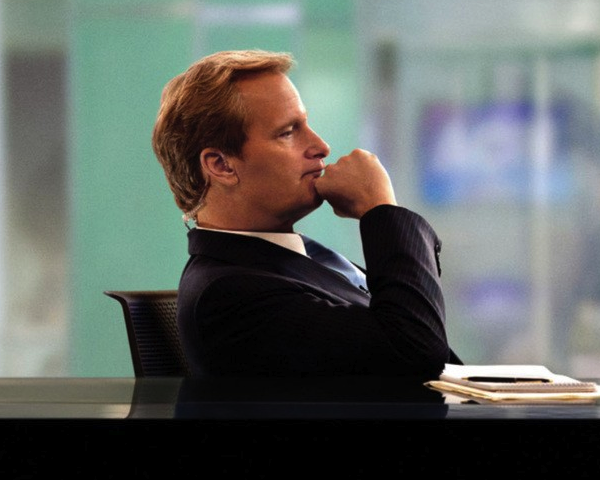The Newsroom: “First Thing We Do, Let’s Kill All The Lawyers”
TV Review
“What’s next?”
The Newsroom returned to HBO last Sunday in full stride, pointing Aaron Sorkin’s writing and well-timed performances towards a new direction for the show that seems to have incorporated and recognized the show’s harshest critiques. I don’t know if the show’s staff intentionally avoided what their critics deemed to be landmines, but they were clearly listening.
In season two’s premiere, we set our scene in depositions and flashbacks, favorite avenues of Sorkinism that viewers of The West Wing and The Social Network will remember. Something bad has happened (as usual), and we must take a trip to the past of the recent fictionalized past (as usual) to pick up the pieces and find the origin of the problem. (Here is probably an appropriate time to reiterate that my biggest problem with Sorkin is his ability and willingness to steal from himself, but I’m getting used to it.) In the show’s “present”, we see that Maggie Jordan (Allison Pill) has traded her blonde locks and conservative dress for short red spikes, jeans, and heavy boots. The reasons are alluded to but go undescribed. We hear about a botched story about military use of nerve gas and a cover operation named “Genoa.” As the story gets underway, we (and the cast) are sifting through the ashes of last season’s final episode. (For a full spoiler-filled recap, see: “The Greater Fool” from last season).
My first thought upon watching the new episode was that Sorkin decided to lead off by showing his characters do well at complicated things. A common critique of last season was the failure of his uber-smart characters to live up to their egos and prosecute the news without bumbling. Aside from their sharp dialogue, the skill sets that drive Sorkin’s behind-the-scenes professional dramas are on full display. In an early scene, Mackenzie McHale (Emily Mortimer) guides her show through an off-the-cuff live audio splicing that saves the crew from embarrassment. Later, Neal Sampat (Dev Patel) follows his instincts towards the Occupy Wall Street movement’s rational beginnings—and the seeds of the drum-circle circus it became. It was refreshing to see Sorkin’s menagerie of characters return to form as dedicated protagonists who—regardless of their eventual destinations—have their hearts in the right places.
The “eventual destination” issue is a particularly itchy one on this episode, though. Hints of catastrophe abound and more questions are raised than answered by the end of fifty minutes. While Sorkin fans will undoubtedly get hooked, the show has set itself up for a necessary payoff that the audience has no indication it will actually receive. Every show is forced to leave its watchers guessing at what’s next, but this show in particular has only the foundation of its first season’s lukewarm reception to rest on. However, regardless of whether season two takes us where its premiere clearly wants to lead us, one has to admire a certain gutsiness in raising, rather than lowering, the stakes of the expectations game for a show that has both rabid fans and haters alike.
Two other blisters stick out for me. First, I find it’s growing harder to get excited about the lines that network boss Leona Lansing (Jane Fonda) uses to flip language on its back like a wriggling turtle, seemingly for their own sake. In one such scene, she scolds news director Charlie Skinner (Sam Waterston) for allowing anchor Will McAvoy (Jeff Daniels) to call the Tea Party “the American Taliban” on the air:
Lansing: “When he said it two weeks ago, I smiled. I said, ‘let the chips fall where they may.’ Know what I’m thinking now?”
Skinner: “I don’t.”
Lansing: “Chips are falling.”
On their face, there’s nothing plainly objectionable about such exchanges, but they’re coming too often from one character and feel somewhat forced into the script without obvious reasoning for their inclusion. Some part of me likes them in the same way I like all of Sorkin’s artful turns of phrase. But I’m starting to get greedy perhaps, and I hope the Charlie-Reese-Leona dialogue becomes more substantive.
My second peeve came when Sampat is pushing the Occupy story and McHale lumps fracking in with a discussion of illogical targets of protest that include horse-drawn carts. This is simply a personal beef that I have when anyone criticizes a protest movement in what could easily be seen as an attempt to avoid another frequent critique of Sorkin’s work: that his characters skew too far to the left. A moment from The West Wing comes to mind, wherein a character notes that there’s no reason for the President to adopt more conservative policies to broaden his political appeal when he can gain similar points from criticizing liberals. I can only hope that this was an oversight and/or a set up to a larger conversation later in the season where fracking’s clearly documented effects are examined.
One of the show’s detractors’ favorite targets is the relationship between Maggie and Jim Harper (John Gallagher, Jr.). For many, Jim has fallen unreasonably in love with a girl he just met and deals with his feelings by engaging in moon-eyed slapstick idiocy (in a bad way). For even more, Maggie displays questionable morals and/or intelligence while inartfully balancing the legs of an unnecessary, contradictory lover triangle (in an illogical—and apparently uncomfortable way, I think). As mentioned last week, I tend to differ from these commentators in my belief that no realistic depiction of love is free from mess. Shakespeare killed people; Sorkin makes them feel so awkward they pray for their own deaths. It’s a living, and for my money (none), it works. Season two’s premiere did a wonderful job responding to the critics of this storyline in a well-executed scene between Maggie and Jim that removes some of the weightlessness (perceived or otherwise) from the love triangle, especially when a later scene with Don (Thomas Sadoski) brings everything that laid beneath the surface to the light of day.
There are many great moments in season two’s premiere, officially titled “First Thing We Do, Let’s Kill All The Lawyers.” Most interesting to me were the solid performances from Sadoski and Sloan Sabbith (Olivia Munn). Other sources have already lauded these two, and it seems the staff behind The Newsroom has listened. Neither of their characters seem to have budged much in personality or direction and the writing for them was classic Sorkin rapid-fire, indicating (to me, at least) that the show may see them as the anchors to a plot-arc that may be strewn with chaos—if we can believe the premiere’s foreshadowing. As mentioned though, the premiere leaves a lot hanging, and it seems clear that we are at the beginning of a long, flashback-heavy storyline whose direction would be inappropriate to guess at. It’s hard to make any kind of judgment at this point, but I think the show came out swinging and pushed back against a lot of its perceived flaws; it remains to be seen whether it can keep up the good work and deliver on the emotional rollercoaster it appears to set up.
Close


